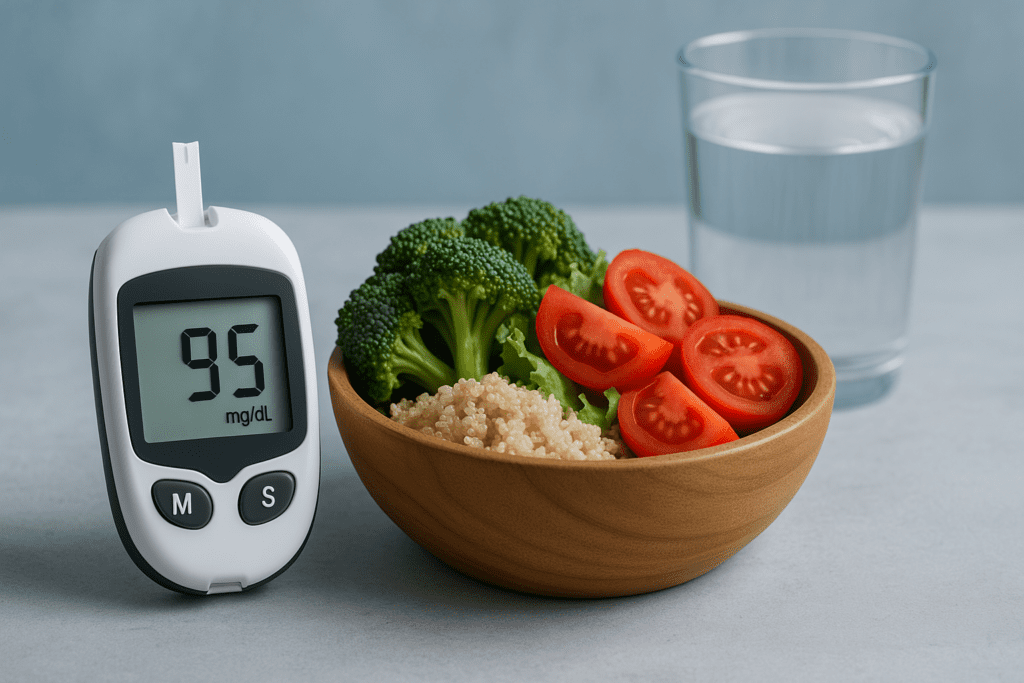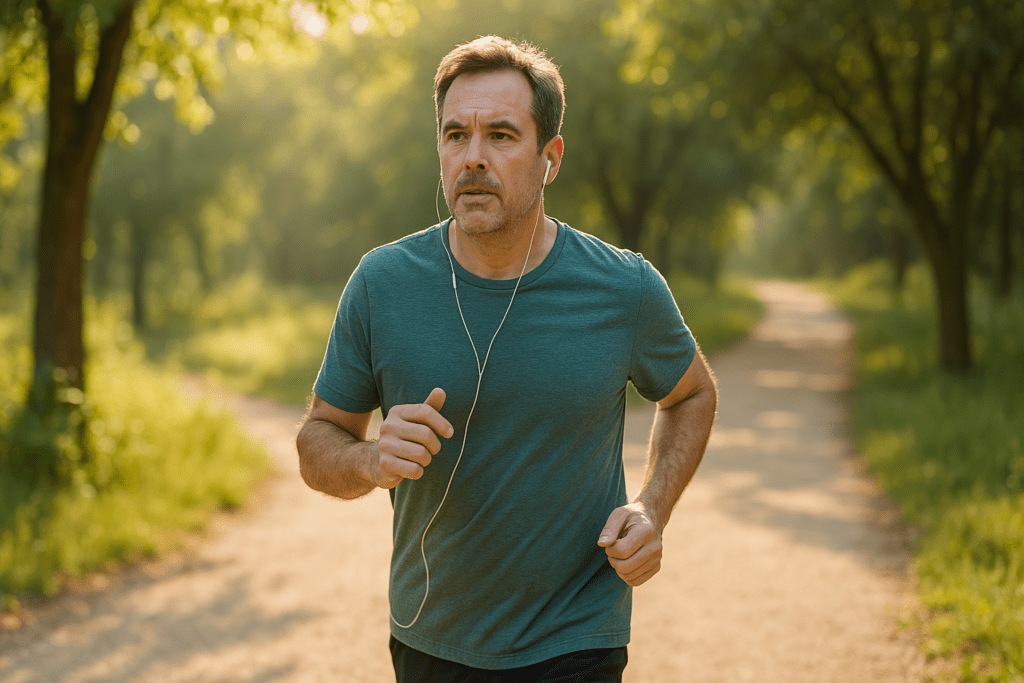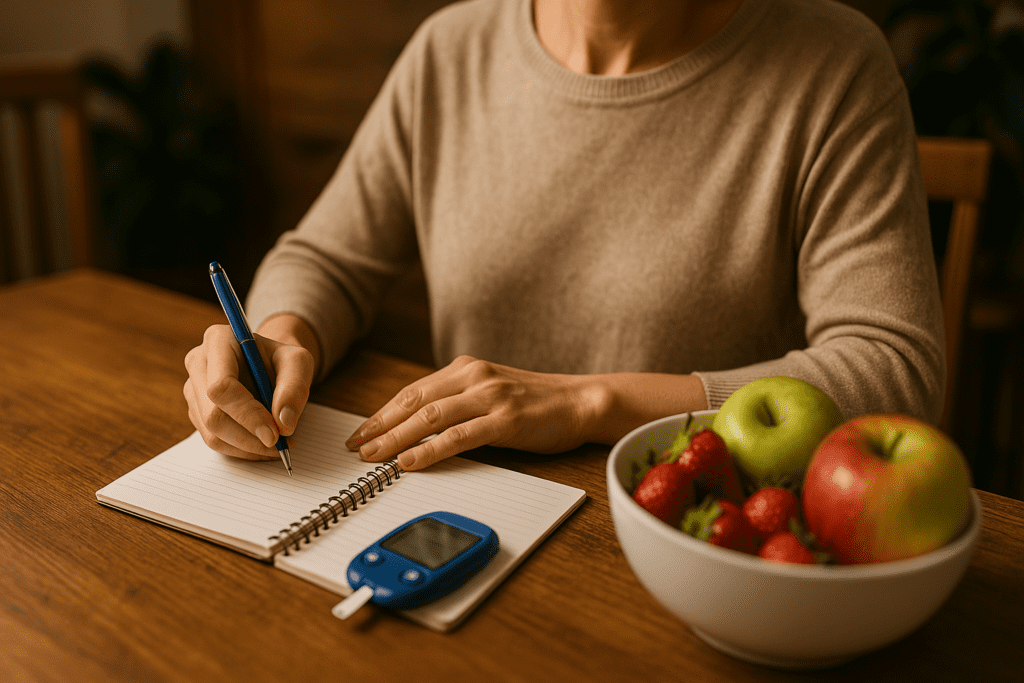Understanding how to lower blood sugar is not just a concern for people living with diabetes. With rising rates of prediabetes and metabolic syndrome worldwide, the importance of recognizing and managing blood glucose levels has become a central focus of nutritional science and integrative medicine. As research into the human metabolic system advances, scientists are increasingly identifying effective and natural ways to lower blood sugar levels. These methods are not only evidence-based but often safer and more sustainable than many conventional pharmaceutical interventions. In this article, we will explore the scientifically validated strategies to lower glucose naturally, distinguish between those that work and those that don’t, and identify the critical moments when more urgent action is needed.
You may also like: How Diabetes Affects the Brain: Understanding Brain Fog, Memory Loss, and Mental Confusion from High Blood Sugar
The Growing Need for Natural Blood Sugar Regulation
Blood sugar regulation is a cornerstone of metabolic health. Poorly managed glucose levels can contribute to inflammation, insulin resistance, cardiovascular disease, and even cognitive decline. While medications play a crucial role in certain contexts, many people are searching for natural ways to lower blood sugar that align with holistic health principles and have fewer side effects. Emerging evidence suggests that nutrition, exercise, stress management, and sleep hygiene can profoundly influence blood glucose regulation.
For those wondering how to reduce blood sugar level immediately or how to bring down sugar levels quickly in an emergency at home, it’s important to understand the physiology behind glucose spikes. When blood sugar rises rapidly, the body attempts to secrete more insulin to compensate. However, in individuals with insulin resistance or pancreatic dysfunction, this mechanism becomes inefficient. Natural interventions that target this imbalance can offer both immediate and long-term benefits.

Dietary Approaches That Work
Among the most effective natural ways to lower high blood sugar, dietary strategies remain foundational. Numerous studies have shown that reducing simple carbohydrates and processed sugars can significantly improve blood glucose control. Whole foods that are rich in fiber, such as legumes, leafy greens, nuts, and seeds, slow the absorption of glucose and support more stable insulin responses.
High-fiber diets have been shown to increase insulin sensitivity and reduce fasting blood sugar levels. For example, soluble fiber from oats, flaxseeds, and beans not only delays gastric emptying but also alters gut microbiota in ways that promote glucose balance. Adding healthy fats, such as those from avocados and olive oil, further stabilizes postprandial glucose responses.
Furthermore, the timing and composition of meals play a role in how to reduce glucose levels. Research supports the idea that front-loading calories earlier in the day and consuming protein before carbohydrates can attenuate blood sugar spikes. This concept, known as meal sequencing, is particularly useful for those exploring how to lower blood sugar naturally without medication.
Supplements with Scientific Support
While not a replacement for proper nutrition, certain dietary supplements have shown promise in helping to lower blood glucose. Chromium picolinate, for instance, has been studied for its role in enhancing insulin activity. Similarly, berberine—a compound found in several plants—has been shown to be as effective as some pharmaceuticals in reducing blood sugar.
Cinnamon, particularly the Ceylon variety, has been investigated for its potential to improve insulin sensitivity and lower fasting glucose. Magnesium, often deficient in those with type 2 diabetes, also appears to modulate insulin signaling pathways. These natural compounds, when used under professional guidance, represent viable options for those asking how to reduce blood sugar level at home.
However, not all supplements marketed for blood sugar control are backed by robust evidence. Bitter melon and fenugreek, for example, have yielded inconsistent results across studies. It’s important to differentiate between anecdotal remedies and those supported by peer-reviewed research.
Exercise as a Potent Glucose Modulator
Physical activity remains one of the most powerful and immediate tools for blood sugar control. Even a single session of moderate exercise can lower blood glucose by increasing insulin sensitivity and stimulating glucose uptake by muscle cells independent of insulin.
Aerobic exercises like brisk walking, cycling, and swimming help reduce blood sugar both during and after activity. Resistance training also plays a role, especially in improving long-term insulin function. Combining both types of exercise yields the most pronounced metabolic benefits.
For those wondering how to lower blood sugar quickly in an emergency at home, engaging in light to moderate physical activity after a carbohydrate-heavy meal can significantly reduce glucose spikes. It’s also been observed that breaking up sedentary time with short bursts of movement improves glycemic control, especially in people with sedentary jobs or lifestyles.
Stress Reduction and the Cortisol Connection
Chronic stress exerts a measurable impact on blood glucose levels. Elevated cortisol, the body’s primary stress hormone, promotes gluconeogenesis—the process of generating glucose from non-carbohydrate sources. Over time, this can contribute to hyperglycemia and insulin resistance.
Mind-body practices like yoga, meditation, and deep breathing have been shown to lower cortisol levels and improve glycemic outcomes. Studies also suggest that individuals with better stress resilience tend to have more stable blood sugar patterns. Those searching for natural ways to lower blood sugar levels should not overlook the role of emotional regulation.
Incorporating regular stress-reduction techniques is more than a lifestyle choice; it is a scientifically supported approach to metabolic health. By integrating these practices into daily life, people can take an active role in managing their blood sugar without relying solely on medication.
The Role of Quality Sleep in Blood Sugar Regulation
Poor sleep—both in duration and quality—has been consistently linked with impaired glucose metabolism. Sleep deprivation can alter circadian rhythms and increase insulin resistance, making it more difficult for the body to regulate blood sugar effectively.
Studies have shown that even short-term sleep restriction can elevate fasting glucose and impair glucose tolerance. Restorative sleep, on the other hand, helps balance appetite hormones such as ghrelin and leptin, which indirectly influence glucose levels by modulating hunger and satiety cues.
Improving sleep hygiene through consistent bedtime routines, limiting screen exposure before bed, and creating a dark, quiet sleep environment can support glycemic control. When combined with other lifestyle strategies, quality sleep becomes a powerful tool in lowering blood sugar naturally.
Myths and Misconceptions: What Doesn’t Work
In the search for how to lower your blood sugar levels naturally, misinformation abounds. One common myth is that drinking excessive amounts of water can rapidly flush out glucose. While hydration is important, it does not act as an immediate glucose-lowering mechanism. Similarly, apple cider vinegar, though mildly effective in slowing carbohydrate digestion, is often overhyped as a miracle solution.
Another misconception is that eliminating all carbohydrates is the best strategy. While low-carb diets can be beneficial, especially in the short term, carbohydrates are not inherently harmful. The key lies in choosing complex, fiber-rich carbs over simple, refined ones. Sustainable blood sugar management involves balance, not deprivation.
Finally, there is a persistent belief that natural equals safe. Many so-called natural supplements lack standardization and may interact with medications or have unintended side effects. Therefore, professional guidance is essential when incorporating these remedies.
Recognizing When to Take Immediate Action
While many people are interested in natural ways to bring down blood sugar, there are situations where urgent intervention is necessary. Symptoms such as excessive thirst, rapid heartbeat, confusion, and frequent urination can indicate dangerously high blood sugar—a condition known as hyperglycemia. In such cases, knowing how to lower blood sugar quickly in an emergency at home can be lifesaving.
Fast-acting insulin is the medical standard for managing acute hyperglycemia, but in the absence of insulin, hydration and moderate-intensity movement can help. However, if symptoms persist or worsen, it is critical to seek medical attention promptly. Waiting too long can lead to diabetic ketoacidosis, a life-threatening complication.
For caregivers, the question of what should you give someone when sugar is high becomes relevant. In most cases, encouraging fluid intake, monitoring blood glucose closely, and ensuring the person rests while avoiding further sugar intake are practical first steps.
Emerging Research and Future Directions
The field of glucose regulation is evolving rapidly. Scientists are now exploring the gut microbiome’s role in modulating insulin sensitivity and blood sugar. Certain probiotics and prebiotics show promise in altering microbial compositions in ways that favor glycemic balance.
Another promising area is personalized nutrition. Advances in genomics and continuous glucose monitoring allow for individualized meal planning based on real-time glucose responses. This approach acknowledges that no single diet works for everyone and that personalization may be the key to sustainable blood sugar management.
Moreover, plant-based compounds such as polyphenols, found in berries, green tea, and dark chocolate, are under investigation for their potential to lower glucose naturally. These compounds appear to exert antioxidant effects and improve endothelial function, thereby enhancing insulin sensitivity.

Frequently Asked Questions: Natural Strategies to Lower Blood Sugar
1. Can stress management techniques help lower blood sugar naturally?
Yes, managing stress is a powerful yet underrated way to lower blood sugar naturally. Chronic stress triggers the release of cortisol and adrenaline, which can increase glucose production in the liver, making it harder to lower glucose naturally. Engaging in mindfulness meditation, progressive muscle relaxation, or breathwork helps regulate the nervous system and supports natural ways of lowering blood sugar. These methods enhance insulin sensitivity, complementing other natural ways to bring down blood sugar. If you’re wondering how to lower blood sugar quickly emergency at home, stress reduction may not offer immediate results, but over time, it’s one of the most sustainable natural ways to lower high blood sugar.
2. What are some overlooked foods that help reduce blood sugar?
While most people focus on cinnamon and apple cider vinegar, lesser-known foods like okra, fenugreek seeds, and lentils are potent tools for lowering blood sugar naturally. Okra contains viscous fiber that slows glucose absorption, offering one of the best natural ways to lower blood sugar levels. Fenugreek seeds contain galactomannan, a soluble fiber that supports how to lower your blood sugar levels naturally. Fermented foods like kimchi and sauerkraut can also promote gut health and stabilize blood sugar fluctuations—offering new paths for how to reduce blood sugar level naturally. Integrating these foods is a practical strategy in natural ways to reduce sugar level over time.
3. How does hydration affect blood sugar regulation?
Staying hydrated is one of the simplest yet most effective natural ways to decrease blood sugar. Water helps flush excess glucose through the kidneys, which is key when trying how to reduce glucose levels efficiently. Adding electrolyte-rich drinks like coconut water or diluted broth (without added sugar) can support insulin function and provide ways to lower glucose levels naturally. If you’re searching for how to lower sugar levels without medication, remember that dehydration can falsely elevate blood sugar levels, making this basic practice essential. Especially in cases of mild hyperglycemia, hydration acts as one of the fastest ways in how to reduce blood sugar level immediately.
4. What role does meal timing play in managing blood sugar naturally?
Meal timing significantly influences how to lower blood sugar naturally. Eating large meals late at night increases the risk of morning hyperglycemia due to the dawn phenomenon. Intermittent fasting—such as the 16:8 method—has been shown to improve insulin sensitivity and can be one of the most impactful natural ways to lower blood sugar. For those looking into how to bring down your sugar level naturally, aligning meals with circadian rhythms offers an advanced tactic. Skipping breakfast, however, can backfire, so it’s crucial to personalize your strategy when exploring natural ways to lower blood glucose.
5. How can physical activity support emergency blood sugar reduction?
Physical movement, particularly aerobic exercise like brisk walking or cycling, is one of the best immediate strategies for how to lower blood sugar quickly emergency at home. Muscle contraction during movement pulls glucose from the bloodstream without relying on insulin—this is especially helpful for those with insulin resistance. Resistance training also offers long-term benefits by building muscle, which naturally lowers blood sugar levels over time. If you’re exploring how to reduce sugar level home remedies, adding short walks after meals is a science-backed approach. It’s among the easiest and most reliable natural ways to lower blood sugar levels without medical intervention.
6. Are there psychological strategies that help with long-term blood sugar control?
Yes, psychological approaches are gaining recognition in the conversation about how to lower blood sugar. Cognitive behavioral therapy (CBT) and health coaching can help individuals shift habits, overcome emotional eating, and adhere to dietary plans—all of which are part of how to reduce blood sugar naturally. Cultivating a positive health identity supports motivation and consistency, making it easier to stick with natural ways to lower high blood sugar. Additionally, journaling and mindfulness can reduce cortisol, further aiding how to lower sugar levels in emotionally driven cases. These approaches go beyond physical remedies and enhance long-term success in naturally lowering glucose levels.
7. What should you give someone if their sugar level is dangerously high at home?
If you’re wondering what should u give someone when sugar is high, focus first on hydration and encourage light movement if the person is conscious and safe. Herbal teas like bitter melon or fenugreek tea are gentle options for how to reduce sugar level in blood home remedies. Avoid giving insulin unless medically advised. Instead, natural ways to bring down blood sugar include cinnamon capsules, apple cider vinegar diluted in water, or a fiber-rich snack to prevent further glucose spikes. For moderate elevations, these can be safe and effective components of how to lower blood sugar quickly emergency at home without panic or overcorrection.
8. How do sleep habits influence blood sugar and insulin function?
Poor sleep impairs insulin sensitivity, making it harder to lower glucose naturally. Even partial sleep deprivation can cause blood sugar to rise the next day, hindering how to lower my sugar levels naturally. Establishing a consistent sleep schedule, avoiding screens before bed, and creating a dark sleep environment are underrated natural ways of lowering blood sugar. Emerging studies suggest that melatonin supplementation may help some people regulate circadian rhythms, improving outcomes for those exploring natural ways to reduce sugar level. Prioritizing sleep is not just a wellness goal—it’s central to how to reduce blood sugar level over time.
9. Are there any cultural or traditional practices for blood sugar control that modern medicine is now supporting?
Yes, many traditional practices from Ayurveda, Traditional Chinese Medicine, and Indigenous healing systems are now being studied for their roles in how to lower blood glucose. For example, berberine—a compound found in some Chinese herbs—has shown effects comparable to metformin in some trials. Bitter gourd, an Ayurvedic staple, is increasingly recognized as one of the best reduce blood sugar remedies at home. These integrative methods offer insight into how to lower your blood sugar levels naturally when conventional treatments aren’t accessible or preferred. As science catches up, more culturally rooted remedies are becoming validated natural ways to lower blood glucose.
10. What innovations or technologies can support natural approaches to blood sugar regulation?
Continuous Glucose Monitors (CGMs) are revolutionizing how people understand the effects of food and lifestyle on their sugar levels. By tracking glucose in real-time, CGMs help personalize how to reduce sugar level in blood home remedies and refine how to lower blood sugar quickly emergency at home. Wearables that track heart rate variability or sleep quality also offer biofeedback to guide natural ways to decrease blood sugar. Pairing technology with lifestyle strategies—like using a glucose app after meals or combining data with diet logs—enhances your ability to discover what things to lower blood sugar work for your body. As tools become more affordable, they will continue to support ways to lower glucose levels naturally with precision.

Conclusion: Embracing Natural, Science-Backed Strategies for Lowering Blood Sugar
Understanding how to lower blood sugar naturally requires a multidimensional approach that integrates science, lifestyle, and individual health needs. From adopting fiber-rich diets and engaging in regular physical activity to managing stress and improving sleep, the natural ways to lower blood sugar levels are both practical and effective when supported by scientific evidence.
Not every remedy is equally supported by research, and distinguishing between evidence-based strategies and popular myths is essential for making informed decisions. For those facing acute spikes, knowing how to lower sugar levels quickly or what should you give someone when sugar is high can provide critical support. But in the long term, consistent lifestyle choices prove far more impactful.
Whether you are seeking to lower glucose naturally, reduce blood sugar remedies at home, or simply find sustainable ways to improve your health, the key lies in applying science-backed, individualized strategies. Embracing these practices with awareness and guidance can transform the way we approach metabolic wellness, enabling not just symptom management but genuine vitality.
ways to stabilize blood glucose, glucose and insulin balance, insulin resistance reversal, holistic glycemic control, lifestyle changes for diabetes prevention, managing blood sugar through nutrition, metabolic flexibility, evidence-based nutrition tips, fiber and blood sugar balance, mindful eating for glycemic control, postprandial glucose regulation, functional foods for blood sugar, diet and insulin sensitivity, best herbs for blood sugar, glycemic index diet plan, natural insulin sensitizers, circadian rhythms and glucose, glucose uptake in muscles, berberine blood sugar support, blood sugar regulation without meds
Further Reading:
How To Lower Your Blood Sugar Naturally
14 Easy Ways to Lower Blood Sugar Levels Naturally
15 Ways To Naturally Lower Your Blood Sugar
Disclaimer: The content published on Better Nutrition News (https://betternutritionnews.com) is for informational and educational purposes only. It is not intended as a substitute for professional medical advice, diagnosis, or treatment. Always seek the guidance of a qualified healthcare professional before making any changes to your diet, nutrition, or wellness practices. The opinions expressed by authors and contributors are their own and do not necessarily reflect those of Better Nutrition News.
Better Nutrition News and its affiliates make no representations or warranties regarding the accuracy, completeness, or reliability of the information provided. We disclaim all liability for any loss, injury, or damage resulting from the use or reliance on the content published on this site. External links are provided for reference purposes only and do not imply endorsement.



